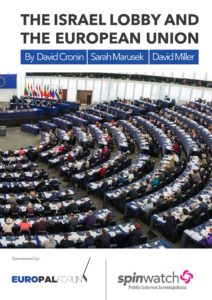 Sponsored by the EuroPal Forum and Spinwatch, this new report by David Cronin, Sarah Marusek and David Miller challenges the secrecy surrounding the pro-Israel network in the European Union capital, Brussels.
Sponsored by the EuroPal Forum and Spinwatch, this new report by David Cronin, Sarah Marusek and David Miller challenges the secrecy surrounding the pro-Israel network in the European Union capital, Brussels.
It identifies where pro-Israel groups receive their funding and how some of their donors have facilitated Israel’s illegal colonisation of the West Bank. It examines how the lobby has persuaded law-makers to refrain from sanctioning Israel over its human rights abuses. And it analyses how Israel’s supporters have been trying to undermine grassroots campaigning for justice in Palestine, including BICOM. Labour Party NEC candidate Luke Akehurst is director of We Believe in Israel, the ‘grassroots’ arm of the UK’s major pro-Israel lobby group BICOM. You can download the full Israel lobby report here.
Excerpt: Europe Israel Press Association
Another recent addition to the Israel lobby in Brussels is the Europe Israel Press Association (EIPA). It was formed in mid-2012 as a kind of public relations consultancy that puts journalists in contact with spokespersons for the Israeli state. EIPA is similar to the Britain Israel Communications and Research Centre (BICOM) in London. Both organisations strive to ensure that the mainstream media treats Israel in a sympathetic manner.
BICOM has sought to attain that objective by cultivating relationships with influential newspapers and broadcasters. A leaked 2011 email message from Lorna Fitzsimons, BICOM’s then director, explained how she had briefed the Financial Times as the newspaper was preparing a leader on the Middle East. The resulting editorial echoed a key Israeli demand that Palestinian refugees should not exercise their right to return home.
When we asked Yossi Lempkowicz, EIPA’s founder and the Brussels correspondent for the European Jewish Press, if his association was modelled on BICOM, he replied ‘not at all’. He argued that ‘EIPA is focused on the media, on helping journalists understand the complexities of Israel;’ whereas ‘BICOM is different’ because ‘it is working with politicians,’ before adding that: ‘We are not working with politicians.’
But while BICOM may work with politicians, it also focuses on the media and EIPA’s own website acknowledges that BICOM had contributed to some of its published material. For his part, Lempkowicz claimed that his cooperation with BICOM was mainly limited to ‘exchanging news, what is happening in the media in the UK’.



